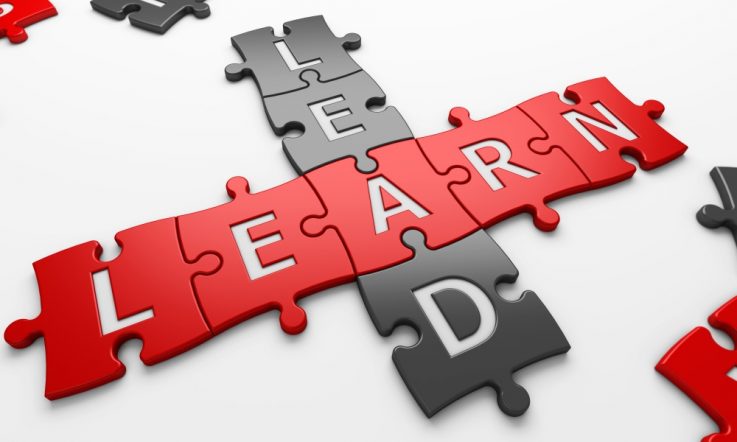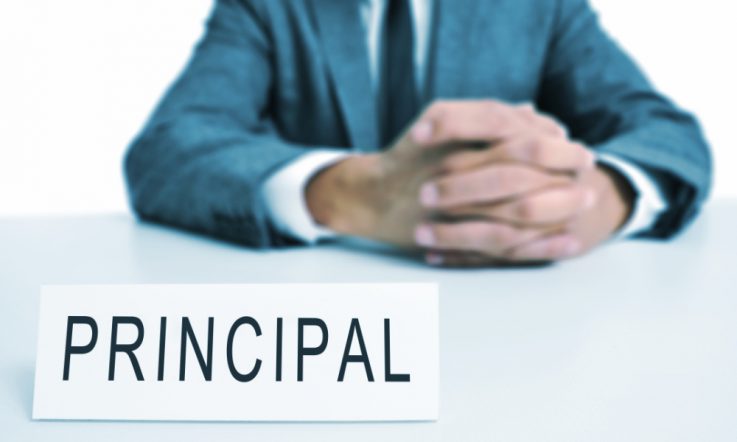This podcast from Teacher magazine is supported by Child Play Therapy at Deakin University. Deakin offers a range of workshops and masterclasses for your professional development. Our annual 2-day Foundations of Child Play Therapy workshop will provide you with practical skills to apply in your current teaching or counselling practice and is also a great introduction to this innovative approach to mental health in children and adolescents. Visit deakin.is/play for more information.
Hello, thank you for downloading this podcast from Teacher magazine – I'm Rebecca Vukovic.
My guest today is Dr Danny Steele, Principal of Thompson Sixth Grade Center in Alabama in the United States. Danny has worked in public education for more than 25 years, he runs a hugely successful blog and Twitter account, and in 2016 he was named Alabama's Secondary Principal of the Year. He joins me for this School Improvement podcast to talk more about the role of a principal in building and maintaining a positive school culture. We cover a whole range of things including how to build positive relationships with students, the importance of genuinely listening to parents, and making difficult decisions as a school leader. To kick things off, I ask Danny to tell listeners more about his school's context.
Danny Steele: Well, I'm teaching in a community that's probably about 15 miles from where I live but I've been working here about seven years as principal. For the first three years I was principal of our high school. Most of my experience, pretty much all of my experience, had been at the secondary level and I was glad to have an opportunity to try to work at a different level. I'd never worked with sixth graders before and so I kind of have a unique experience where I'm a principal of a school with 500 sixth graders and there also has not been quite the same commitment in terms of the extra-curricular activities so it allows me a little bit more time with my own family.
Rebecca Vukovic: You recently wrote a really interesting tweet about meeting with parents over a discipline issue. And you said, ‘after listening to the parent's points, I changed my mind. Frankly, the Dad's points were stronger than my points. We don't always get it right the first time. Sometimes we need to change'. As a school leader, why is it important to admit when you get things wrong?
DS: Well, first and foremost we're in it for the kids – that's hopefully why we're all in education. And my top priority is to always do right by our kids, by our students. So if I get the sense that somehow that a direction I'm headed is not in the best interests of the students or maybe is not the right thing or the just thing, I'm going to change courses if I need to. It's important to me to always get it right and do what's in the kids' best interests if I can.
RV: So when it came to changing your mind, what kinds of things did you need to consider before sharing that decision with everybody involved?
DS: Well first it starts with a willingness to listen to the parent. So you have to be open-minded and willing to actually listen to the parents' point and listen to what they're saying and try to understand things from their perspective. I needed to make sure I somehow wasn't undermining another adult in the building, by changing my mind I didn't want to inadvertently throw somebody else under the bus that was working in our school. I didn't really have to confer with anybody, but just after listening to the Dad, I realised that I needed to change my mind.
RV: I was wondering what changing your mind demonstrated to the student and the parent involved.
DS: Well I think oftentimes, kids and parents are not really used to being heard. I think most times when they go to question or challenge an adult in the building, they feel like they're just talking to a brick wall but they're not really going to be given the time of day. So I think, I know the parent really appreciated me listening to him and I think it caught him off guard when it ended the way it did. So I think people appreciate it when they realise that your goal is to really do the right thing.
RV: You've said before that principals shouldn't do it alone and should involve others in the decision making process whenever possible. But there are also times when you as the principal need to make decisions, possibly really difficult ones. Is this also a really important part of leadership?
DS: Well certainly as the principal you realise that you're ultimately the one responsible and you're never going to make everyone happy with all of your decisions. And so you have to be able to go to sleep at night knowing that you're making decisions that are in the best interest of the students. That being said, there's very few times where it's not possible to collaborate with other adults in the building.
There's very few times where you're not able to get other people's opinions. As you referenced earlier, that collaboration piece and the decision making process is really huge, but ultimately once you've gotten input that you can get, once you've thought through the possible repercussions of the decision, you have to be prepared to just make the decision knowing that you're doing what's in the best interests of the kids, what's in the best interest of the school.
RV: And also a part of that is maintaining positive relationships and I know that positive relationships are important not only for the students' learning but also for school culture. So could you share more about how you build strong relationships with the families in your school?
DS: Well the relationship piece, it's really not possible to overstate that. I think that everything that we do, any success that we have is predicated on building strong relationships. I feel like I've always been focused on connecting with students but something I've done the last couple of years, which has been very successful and quite frankly, it's been really fun is something called ‘birthday selfies with the principal'.
So if it's your birthday at my school you get a shout out on the intercom when I do the morning announcements. And then at some point during the day I'll come and get you out of class for a minute or two and speak to you, wish you a happy birthday, just talk to you briefly about how the school year is going and then I'll take a ‘birthday selfie with the principal' with you. And I've got a little app on my phone that puts a text over it, it's called Word Swag so we take the selfie and I put a little text over it that says ‘birthday selfie with the principal' and then I text it to the students' parent. I text it from my own personal phone, I tell them it's from me and it's been a really cool thing that pretty much all of the kids enjoy and it really makes a lot of the parents' day when they get it. They end up sometimes putting it on their Facebook page or sharing it with other family members.
Every kid deserves to feel special on their birthday so this has been a very cool tradition, a cool way of connecting with kids on their special day, and then also connecting with parents. It was a big step for me to start texting parents from my personal cell phone but it has been nothing but a good experience that has generated so much goodwill with the parents, so I can't believe I wasn't doing this years ago.
RV: That's such a fantastic little example there. And I know you've been in the position at the school, for it's 4-5 years, isn't it?
DS: Yeah I'm finishing up my fourth year.
RV: So, what have been some of the most significant changes you've been able to make to school culture over that time?
DS: Well when I first came, at our very first faculty meeting, we did an activity where I gave out a copy of the Hippocratic Oath to all of our teachers, which is the oath that physicians take. At least they do it in the States, I don't know if around the world they do something like that, but it's an oath that doctors take – that they're committed to looking after the wellbeing of people and they're always going to do everything they can to save human life and things like this. And so I asked our teachers to read this and to highlight the phrases from the oath that resonated with them as educators. There would be a line in this oath that would say, ‘I will remember that I don't treat a cancer but I treat a patient', or ‘I don't treat a fever chart but I treat a human being'.
And so as a teacher you read that and you think, ‘I don't teach maths, I teach kids' or ‘I don't teach fourth grade, I teach students'. And there were just a lot of things that resonated with educators so we talked about that and then I asked the teachers to work on developing their own teacher oath, which is a commitment, it's basically an articulation of their core values as an educator. It's the things that drive them to come to work, it's their commitments to their kids, to their colleagues, to the parents. And I encourage teachers to post this oath outside their room, I encourage them to put it on their websites. So that's an important step in terms of establishing a foundation of what we're about as educators here at our school.
I try very hard, we try very hard at our school to bring positive energy every day… And then the other thing I would add is we've worked really hard to build a culture of collaboration where the adults are learning from each other, where adults are comfortable observing each other, learning from each other. I think when the adults collaborate, the kids are going to benefit. And I realise this is not a novel thing, it's not innovative. Collaboration is, I think, recognised across the world as best practice for educators, but those are three things that I want our school to be known for. Positive energy, collaboration, and then relationships with kids and connecting with kids. Those are the three things that I'm most proud of in terms of building our school's culture.
That's all for this episode - to keep listening or to download all of our podcasts for free, whether it's more on School Improvement or our series on Behaviour Management, The Research Files, Teaching Methods, Global Education or Action Research, just visit acer.ac/teacheritunes or soundcloud.com/teacher-ACER. The full transcript of this podcast is available at teachermagazine.com.au. That's where you'll also find the latest articles, videos and infographics for free.
This podcast from Teacher magazine is supported by Child Play Therapy at Deakin University. Deakin offers a range of workshops and masterclasses for your professional development. Our annual 2-day Foundations of Child Play Therapy workshop will provide you with practical skills to apply in your current teaching or counselling practice and is also a great introduction to this innovative approach to mental health in children and adolescents. Visit deakin.is/play for more information.
This school aims to build a culture of collaboration where adults learn from each other. How do you encourage collaboration in your own school setting? In what ways could you improve this practice?
Danny Steele say that as a school leader, when an issue arises you have to be open-minded and willing to listen to the parents’ points of view. Think about an instance where you’ve had to navigate a difficult situation involving parents. How was it resolved? Did you demonstrate that you were genuinely listening to the parents’ concerns?



